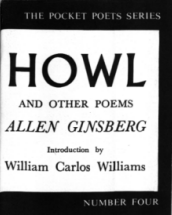
The real paradox of "Howl" is that it's a poem, a great poem that addressed the great unwashed elements of American culture and their plight outside the mainstream which is now very much part of the Establishment it railed against and, in some sense, sought to disassemble.
Only truly great pieces of writing do that, and regardless of what one thinks of the later Ginsberg work where he abandoned Blakean visions and allegory in favor of a relentless and largely inane species of self-reporting , "Howl" is the inspired and wonderfully sustained work of a young in full control of the language and rhetoric he was using.
It's a masterpiece by every criteria, and it remains a powerful indictment against repression, censorship, the closing off of the soul against experience and vision.
Even as its been absorbed into the American canon, it continues to transgress against expectations of conservative decorum and other constructions of serene and apathetic community relations; it continues to howl, quite literally, over the fifty years since it's publications.
In the increasingly control-freak environment of that pits paranoid nationalism against civil liberties , "Howl" and it's piercing message is perhaps more relevant than ever.
The fact that one still finds room to discuss the poem's politics and philosophical biases seriously attests to the quality and originality of Ginsberg's writing; mere political tracts, like Baraka's "Someone Blew Up America", will grind you down with polemic and are rapidly, gratefully forgotten.
"Howl", poem, vision, political screed, confession and testament in one, is read and debated over and over again, its choicest lines cited, each quote resonating and stinging as great work ought to. A great poem.


No comments:
Post a Comment
Comments are moderated due to spam. But commentaries, opinions and other remarks about the posts are always welcome! I apologize for the inconvenience.